NATURAL CHEESE
The project promotes natural cheeses from different European and Portuguese regions, like Azores, Portalegre and Beira Baixa.
In the basket of the products of the PO there are cow milk cheese, goat milk cheese and cheese made from ewes’ milk taken from local Merino breed sheep. For sheep and goats, perfectly adapted to natural conditions, spontaneous pastures are reserved, with climatic, pedological and pluviometric parameters. Characteristics that are reflected on the milk product of these animals, giving each cheese unique and distinct properties.
Genuine and tradional products
Natural cheese is produced using only fresh milk and natural ingredients. The modern manufacture of natural cheese consists of four basic steps: coagulating, draining, salting, and ripening. No two cheese varieties are produced by the same method! The major differences between processed and natural cheese are that processed cheese incorporates extra steps, including cleaning, blending, and melting. Additional ingredients, such as vegetable oils, salt, food coloring, or sugar may be included. Processed cheese typically contains around 50 to 60% traditional cheese.
In addition to taste, aroma, nutritional kit, safety, practicality of use, versatility, innovation, the quality of the cheeses of the CCILJ members is intimately linked to the characteristics and healthiness of the raw materials and the skill of the cheesemakers, who have made it a very rich dairy tradition. Natural and nutritious cheeses, among which some quality denominations also stand out.
Portuguese Eu protected cheeses
There are now 11 PDO and one PGI Portuguese cheeses, from which we highlight 10 PDO.
Queijo do Pico PDO
The Queijo do Pico PDO cheese is made from raw cow’s milk. It’s a mature cheese with semi-soft buttery paste and white-yellowish shade.
The raw cow’s milk is coagulated with natural rennet at temperature of 26 to 27 °C and resting about 45 to 60 minutes. After occurs the curd cutting, getting small cubes which will be filtrates with thin clothes to remove the remaining whey. The mouls are filling with residual curd and hand pressed, then the cheeses are dry salted on both sides. The maturation process occurs at temperature of the 15 to 17 °C and relative humidity at between 75 and 85% over a period of 17-30 days.
To produce Queijo do Pico PDO cheese is used milk from dairy cows living in extensive production conditions, having access to the cultures like perennial ryegrass, Italian ryegrass, hop trefoil and sweet pittosporum. About the product, its diameter is from 16 to 17 cm and the weight is from 700 to 800 g. The flavor is salty, intense and pleasant aroma.
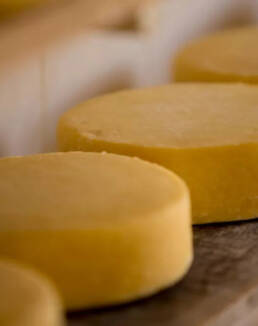
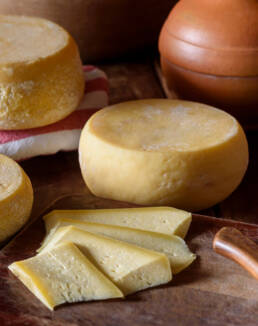
Queijo Rabaçal PDO
Queijo Rabaçal PDO is a cured cheese, of semi-hard to hard consistency, with few to nonsmall irregular holes spread over the mass, dull white in colour, artisanaly produced from a mixture of ewe and goat milks, through the action of an animal rennet.
The hand-milked milks are transported to the dairy, where they are filtered through a cloth to the container where they are mixed and coagulated using a rennet of animal origin. After clotting (which lasts 45 minutes to 1 hour), the curd is removed by hand to a colander, and then deposited inside a mold. When the serum is completely exhausted, the cheese is lightly hand-pressed and salted. 2 to 4 days later the straps are removed, and the cheeses are placed on shelves to mature. During maturation the cheeses are washed 3 times per week scraped with a piece of tile, a knife or even a fig leaf, cleaned with a cotton or linen cloth and placed again in the healing site. The maturation can be no shorter than 20 days.
Many of the distinctive features of this cheese are due to the spontaneous and very profuse in the region thyme called “Santa Maria”, on which the ewes and goats that provide the milk for this cheese feed.
Queijo Terrincho PDO
The Queijo Terrincho PDO cheese is made with raw milk of Churra da Terra Quente breed of sheep. It’s a mature cheese with semi-hard to hard paste (Queijo Terrincho Velho) and white to yellowish shade.
After the sheep’s milking, the milk is filtrated and heated until 35 ⁰C. The rennet is added and left at rest. Then the coagulation, the curd is placed in the mouls, where the curd draining occurs and the whey is removed. Cheeses are taken from mouls, salted and follow to the drying process. After this process occurs the maturation for 30 days (excepting for the Queijo Terrincho Velho that its period is 90 days) at temperature of 5 to 12 ⁰C and relative humidity of 80 to 85%. The cheeses are also washed and turned frequently.
The distinctive features of Queijo Terrincho PDO cheese are due the way of keeping the sheeps, in extensive method. In natural conditions in mountainous region of Terra Quente, with access to different pastures. Regarding to the product, its diameter is about 13 to 20 cm, and the weight is between 800 to 1200 g (600 to 1100 g for the Queijo Terrincho Velho). Its flavor is delicate, clean and typical (hard and typical for the Queijo Terrincho Velho).
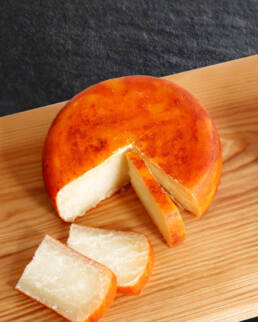

Queijo Serra da Estrela PDO
The Queijo Serra da Estrela PDO cheese is made with milk from the Bordaleira Serra da Estrela and Churra Mondegueira breeds of sheep. It’s a cured cheese, which can present a semi-soft buttery paste and white-yellowish shade (Queijo Serra da Estrela) or semi-hard to extra-hard paste and brownish orange color (Queijo Serra da Estrela Velho).
The beginning of manufacturing process of Queijo Serra da Estrela is sheep milking then occurs its filtration through muslin clothes. The milk is heated till to 28-32 ºC and salted. The thistle flower Cynara cardunculus is added (about 0,2 to 0,3 g), being previously milled and salted. After 45 to 60 minutes manually cut curd and a new filtration is performed to remove the remaining serum. When the molding, pressing and new salty processes are done there follows the maturing step. This consists in two phases. The first during till the 15-20th day. At temperature of 6 to 12 ºC and relative humidity of the 85 to 90%. Turns and daily washes are made. The second phase during till the 45th day at temperature of 6-14 ºC and relative humidity of 90 to 95%. The turns and washes are made occasionally, depending on the rind aspect. To produce the Queijo Serra da Estrela Velho are used the same temperatures and relative humidities ranging only the maturing period for 120 days.
The milk used to obtain the Queijo Serra da Estrela DOP comes from sheep bred in the hills that gave it its name, with access to spontaneous pastures. The dimensions of Queijo Serra PDO are 9 to 20 cm of diameter and 4 to 6 cm thickness. The flavor is delicate, clean and slightly acid. Regarding to the Queijo Serra Velho PDO its diameter is about 11 to 20 cm and its thickness is 3 to 6 cm. It has a pleasant, persistent, clean, strong to slightly stronger and lightly salted and spicy flavour.
Queijo de Nisa PDO
The Queijo de Nisa PDO cheese is made with raw sheep’s milk, from the Merina Branca breed of sheep. It’s a cured cheese with semi-hard paste and yellowish white shade.
The produce process begins with the addiction of thistle infusion (Cynara cardunculus L.) for the milk at temperature of de 25 to 28 °C, during 45 to 60 minuts. After this process occurs the first cut of the curd to remove part of the whey. Then, the curd is placed in the moulds, pressed by hand curing. Lastly occurs the maturation process, which is divided into two phases. The first lasts about 15 to 20 days at temperature of 8 a 10 °C, and relative humidity of 80 to 90%, on the other hand, second phase lasts 30 to 40 days, occurs at temperature of the 10 to 14 °C, and relative humidity of 85 to 90%.
Queijo de Nisa PDO cheese is only made by local cheese makers, who are however famous throughout the country for the quality of their cheeses, which are artisan made. It can be present in “merendeira” format, with 10 to 12 cm of the diameter and 200 to 400 g of the weight. Or in original format, with 13 to 16 cm of the diameter and weight of the 800 to 1300 g.
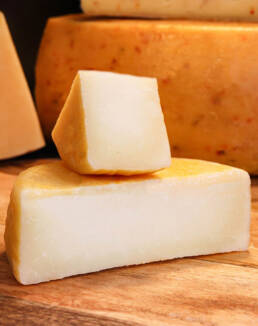
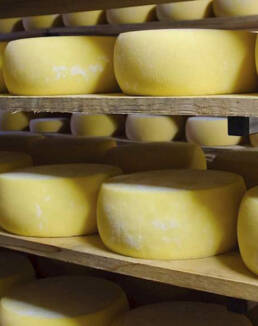
São Jorge Cheese PDO
The queijo São Jorge PDO cheese is made from raw cow’s milk. It’s a mature cheese with hard or semi-hard paste and yellowish shade.
The raw cow’s milk is coagulated with natural rennet after the whey addiction (from preceding cheese making process to promote the acidification). The whey is later removed. The mouls are filling having the particularity to put a label of casein in one of cheese sides and the maker’s code. This process makes it possible to determine its age, the maker and other information required to check the quality of the final product. Then, the curd is pressed and letting rest during 30 days at natural temperature. As last operation occurs more 60 days of maturation process at controlled temperature of 12 to 14 ⁰C and relative humidity at 80 and 85%.
The distinctive features of queijo São Jorge PDO cheese are by one hand, the edafo climate conditions, that promotes diverse cultures, that in turn influencing positively the milk quality. The other hand its production method practically unchanged by 500 years promotes, on more time, the singularity of the product. Regarding its physical characteristics, this has a diameter of about 25 to 35 cm and a height of 10 to 15 cm. The taste and aroma are strong, clean and slightly spicy.
Queijo de Cabra Transmontano / Queijo de Cabra Transmontano Velho PDO
The Queijo de Cabra Transmontano PDO cheese is made with from the Serrana breednof goat milk. It’s a mature cheese, with extra-hard paste and uniform white color.
To produce Queijo de Cabra Transmontano PDO occurs the milk filtration process and its heating till to the 35 °C. Then, the milk is coagulated with natural rennet. The curd resulted is placed in moulds and is pressed by hand to remove all the whey. After this process, the cheeses are salted and left to mature for a minimum of 60 days at a temperature of between 5 °C and 18 °C and 70% to 85% humidity.
The particularities of Queijo de Cabra Transmontano PDO are due its artisanal and practically unchanged production, over the years. Are also due the features of the used milk. The dimensions of this product are of 12 to 19 cm of the diameter and weight of the 600 to 900 g. It has an intense and pleasant aroma, a clean taste with a hint of spice.
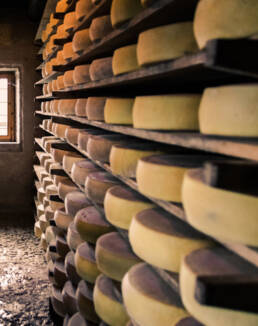
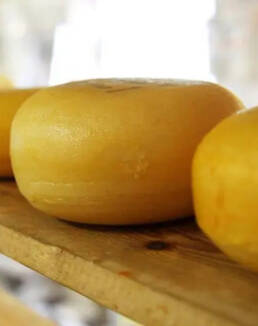
Queijo da Beira Baixa PDO
The Queijos da Beira Baixa PDO includes the follow cheeses:
- Queijo de Castelo Branco – is made with raw sheep’s milk. Is a mature cheese, with semi hard or semi soft paste and yellowish colour.
- Queijo Picante da Beira Baixa – is made with raw sheep’s milk and goat’s milk. Is a mature cheese, with semi hard to hard paste and grayish white colour.
- Queijo Amarelo da Beira Baixa – is made with raw sheep’s milk or with sheep’s and goat’s milk. Is a mature cheese, with semi hard or semi soft paste and yellowish colour.
The manufacturing methods of Queijos da Beira Baixa PDO depends on the type of the desired cheese, namely:
- Queijo de Castelo Branco – it’s used a natural rennet (Cynara Cardunculus) and the maturation process are made with 8 to 14 °C of temperature and 80-90% of relative humidity, during, at least, 45 days. Regarding “Queijo de Castelo Branco Velho” the process during, at least, 90 days.
- Queijo Picante da Beira Baixa – it’s used the animal rennet and the maturation process makes with 10 to 18 ºC of temperature and 70 to 80%, for 120 days.
- Queijo Amarelo da Beira Baixa – the rennet used is from animal source and the maturation process is between 10 to 18 °C and relative humidity of 70 to 85%, for 45 days. Like Queijo de Castelo Branco its maturations can be extended untill 90 days (in minimum), turning a mature with hard to extra-hard paste, usually called “Queijo Amarelo da Beira Baixa Velho”.
The distinctive features of Queijos da Beira Baixa PDO are due the flocks of sheep are kept out in the fields in the open air all the year round. They are having access to different pastures, some of which is specifically planted.
Regarding to the products, they have the follow characteristics:
- Queijo de Castelo Branco – Has a diameter of 12 to 16 cm and weight between 800 to 1300 g. The taste and aroma are intense and a little spicy for “Queijo de Castelo Branco Velho”.
- Queijo Picante da Beira Baixa – Has a diameter between 10 to 15 cm and weight between 400 to 1000 g. The aroma is intense and typical, and the taste is strongly spicy.
- Queijo Amarelo da Beira Baixa – Has a diameter between 7 to 10 cm and weight between 200 to 500 g. The aroma is intense and pleasant; however, the taste is clean and a slightly acidified.
Queijo Serpa PDO
Queijo Serpa PDO is a cured cheese, of a buttery, semi-soft consistency, with few or no holes, obtained by slowly draining the curds, after coagulation of the pure, raw ewe’s milk, through the action of a cardoon (Cynara cardunculus L.) steep.
The manufacture is done twice a day, in order to reduce as much as possible, the length of time elapsed after milking. The maturation process takes place in local natural healing or controlled atmosphere facilities. The maturation process occurs over a period of 30 days. It undergoes two salting processes, the first at filter time and the second when the moulds are already filled for serum depletion.
Queijo Serpa PDO cheese has some process particularities like the cut being done with only four movements, practiced based on religious beliefs. In addition, the use of a muslin cloth folded exactly 40 times to filter the milk.

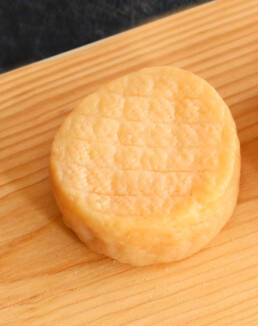
Queijo de Évora PDO
The Queijo de Évora PDO cheese is made with raw sheep’s milk, from the Merina Branca breed of sheep. It’s a cured cheese with hard or semi-hard paste and yellowish shade.
To produce Queijo de Évora PDO cheese occurs, initially, the milk filtration process with salty cloth.The milk is then heated over a low, wood burning fire, and is added the thistle infusion (Cynara cardunculus L.), of local variety. Coagulation takes from 20 minutes to 40 minutes, and then the whey is removed. The maturation process is about 30 days for semi-hard paste cheese and 90 for the hard paste cheese. Are both at temperature of 8 to 15 ⁰C and relative humidity of 80 to 95%.
Queijo de Évora PDO cheese can be present into a different format, namely:
- “small” from hard paste, with 6 to 8 cm of the diameter and 60 to 90 g of the weight;
- “merendeira” from hard paste, with 12 to 14 cm of the diameter and 120 to 200 g of the weight;
- “merendeira” from semi-hard paste, with 13 to 15 cm of the diameter and 200 to 300 g of the weight.
It has a distinctive aroma and taste, slightly spicy and acidic, which is more accentuated in the harder chesses.
